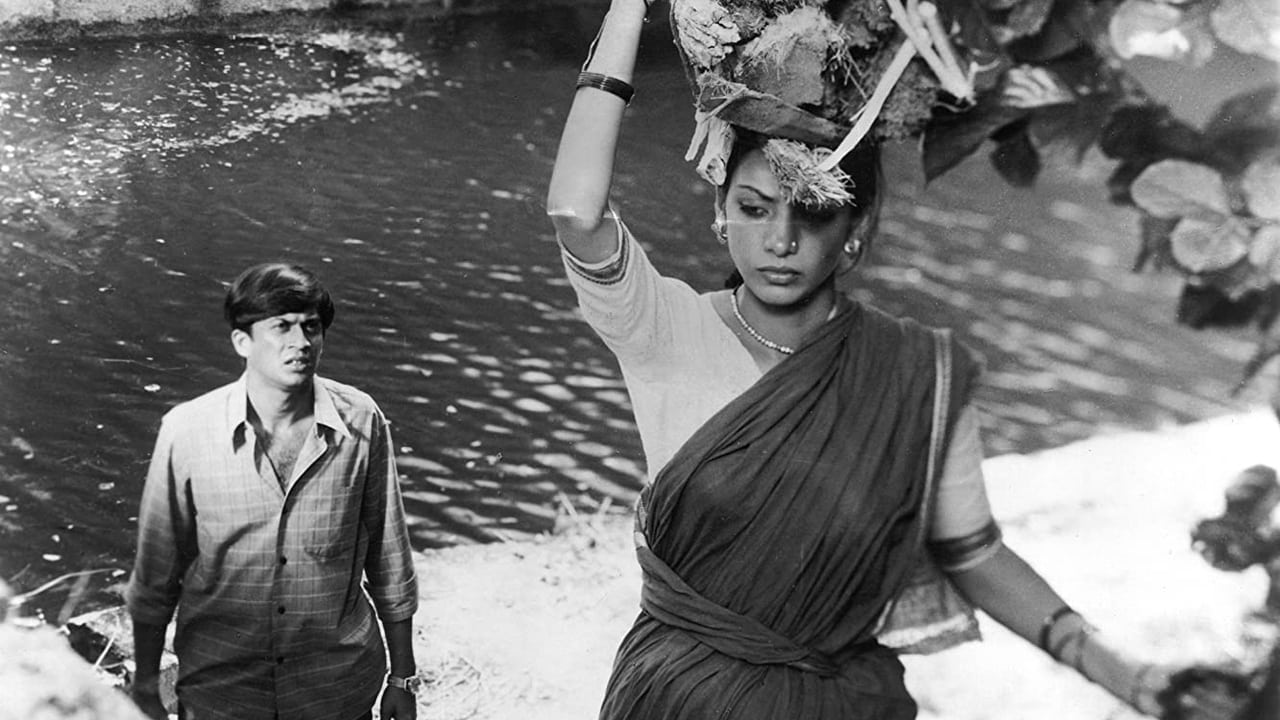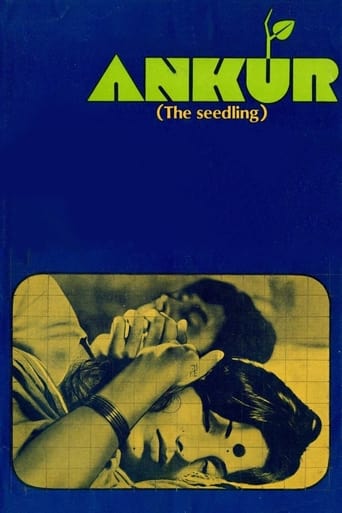

To me, this movie is perfection.
... View MoreSome things I liked some I did not.
... View MoreMasterful Movie
... View MoreAbsolutely Fantastic
... View MoreAnkur means the Seedling. And indeed, this film was a seed to the parallel movement in films that ran in 70's and 80's. It's a wonderful depiction of the reality which existed then, and even today in some remote parts of India. The narrative is simple and indeed very slow, there are no major subplots as the main plot in itself is heart rending and superior to many films that have come till then. In an age, where superstars were being made, and Amitabh Bachhan was transformed as Angry Young Man, this film silently made its way into the public with a limited released and later on with the word of mouth. All because of many good traits that the film possesses.Shyam Benegal, who is now considered as a father of Parallel Cinema, wrote this long back and had to go to struggle to a lot to get this made. All this was done with a meager budget and the product that was obtained out of the hard work is a stand-out even today. Ankur is a pioneer and has it's moments of greatness considering the time, it was made. Subsequently, even Shyam Benegal was revered as a great film maker as many more wonderful films came from him.Now, today when I saw it, it felt a bit anachronistic and antiquated coz I do not see such kind of vulgar oppression anywhere now, may be there is but it's not reported or it's not there any more. Having said that, the emotions are universal and the feeling of being oppressed, the helplessness, the hopes that are there for well being and then a revolution being sparked. All this is put wonderfully. The last shot where a boy throws a stone at the Zamindar's house is of great symbolism and portrays a feeling that echoes with the poor who keep the poor as poor. The acting was superb, Shabana Azmi was a revelation and a blessed actor and we were grateful to have firstly and also grateful for makers to give her ample opportunities that helped her showcase her talent with an array of emotions. Thanks to Benegal to have found her and given Shabana to us. It needs applause in many areas, firstly for starting a kind of cinematic revolution in India. Yet, my only crib is the editing, I wish the film could have been slicker with sharp editing. It would have added to the pace and helped the new-age viewers like me. I am going with 4/5. It's a kind of film that's strong in social issues. But it's a laid back film that makes us recede in time. So just be warned of the pace coz it's a great film.
... View MoreThe film, based on a short story by the director himself, was shot in a village somewhere near Hyderabad in Andhra Pradesh. The protagonist speaks in a 'Dakhini dialect' close to Hindi, which in the words of Shyam Benegal, was chosen to have a wider appeal across the country. The tale of exploitation of the poorer section of society by the rich landlords is seen through the predicament of Lakshmi (Shabana Azmi), a maid who falls into a trap of an illegitimate relationship with the young landlord (Anant Nag) when her husband (Sadhu Meher) forsakes her for a while and goes off elsewhere to escape the humiliation he was meted out by Anant Nag for an innocuous act of petty stealing. The scene where Meher is shaved off his hair and paraded on a donkey across the village is a depiction of rural India much as it exists in reality. Shabana Azmi excels in the dramatic sequences towards the climax. The cinematography by Gobind Nihalani is excellent, and sequences such as rain pouring on a tin roof in village houses exude charm of the rural backdrop.Rating: 3.8 out of 5
... View MoreAnkur is Shyam Benegal's first movie and amongst all his gems, this is one of those his name will be most associated with. The film was a unique feature of its time - real, poetic, genuine and disturbing. It did not have the songs, the melodrama, and the exaggeration one was used to see in Hindi movies. Instead it had an unusual and gripping storyline portrayed with striking maturity and realism. This film actually established a new genre within the Hindi film industry at the time, commonly known as 'New Wave Cinema', while today people use to describe it as 'Parallel Cinema'. The film was not only special in the way it was treated, but the story itself seemed to have tackled themes which till date are categorised as social taboos in Indian cinema, whether it's adultery or sexual frustration. The film's writers use symbolism to convey the story and many interesting paradoxes and ironies.Ankur tells the story of Lakshmi, a young and serious village woman who works as a housemaid in the landlord's house and who is married to a deaf-mute man who keeps drinking. She sets on an affair with the landlord's son, Surya, who came to the village on his father's insistence to run the family business. From the very beginning of his staying there, he gets very attracted to Lakshmi. After being accused of stealing, Lakshmi's husband gets publicly humiliated by the villagers and later disappears. That's when Lakshmi and Surya's interaction grows and becomes constant. Their relationship, however, ends soon as Surya's young bride comes home. Lakshmi finds out that she is pregnant and Surya refuses to accept her, as he has also been persuaded by his wife to throw her out. A pregnant Lakshmi finds herself all alone struggling for survival, until one day her husband returns with a clear intention to make amends, very happy to find his wife's state but little knowing that he is not her child's father. Benegal's direction is outstanding. He captures the rustic, simple and raw atmosphere of the village with all its cultural customs which would seem peculiar to people not familiar with this kind of lifestyle. He just pays attention to the smallest of details, and that's what makes it so extremely realistic. Whether it's the serene narrative style, the way the proceedings are unfolded, or the way the characters are brought out on screen, all these aspects contribute to this and manage to make the film tense and thrilling. The character of Lakshmi, for instance, is presented as an extraordinary beauty amongst the many ordinary-looking people in the movie, and the viewer can really see why a bored Surya can't take his eyes off her. Ankur is very matter-of-fact in its depiction. It is brutally honest and not even once does it feel sugarcoated or unconvincing. The film's dialogues are fantastic, especially those towards the end.The brightest spot of this movie and the main reason it tugs at your heartstrings is unquestionably Shabana Azmi's powerhouse performance. Ankur is actually her first role, and it still ranks amongst the finest works of her illustrious career. Portraying her role with depth and sincerity, Azmi manages to convey a lot with just sitting silent in front of the camera. Her facial expressions, body language and line delivery are exemplary. Lakshmi draws the audience's sympathy despite being pretty unlikable. She hardly smiles once throughout the film, and looks indifferent to her surroundings, yet the viewers may really feel for her as they see her despair, her non-verbal pain and grief, her inner conflict, her daily struggles and ultimately her conscience and guilt feelings. It goes without saying that Azmi's emotional outbursts towards the end are superbly acted and moving. This one is an all-time great performance by a talent that is even greater.Apart from Azmi who owns the show from start to finish, the acting in the movie is roundly natural. Anant Nag as Surya does a very good job. Sadhu Meher is excellent as Lakshmi's helpless and loving husband. Priya Tendulkar too performs well. The last few scenes of the movie are very intense and heartbreaking. The ending is by far one of the best endings I've seen in a Hindi film - meaningful, unusual and thought-provoking - descriptions which would be perfectly used to describe the film itself. Ankur, to put it simply in just a few words, is one gem of a movie.
... View MoreAnkur is literally one the best Indian movies I have ever seen actually, it ranks as one of my most favorite films of all time. There is something to be said about the Indian Film Industry while it has altogether crumbled and become wildly glamorous and crass, many of the Indian movies since the advent of cinema and up until the early eighties were stupendous, thought provoking, and wholly a testament to the power of film.Ankur takes place in rural Andhra Pradesh, where a young man fights his father's wishes to run the family farm. He loses the battle, as all good boys would, gets married, and takes up agrarian life. His switch to that lifestyle is jarring, and he becomes rapidly bitter and enraged essentially greed takes a hold of him, and he is unable to control himself in many respects. The story continues, largely focused on his housekeeper, Lakshmi (Azmi), and his relationship with her and the surrounding townspeople. His seemingly consistent life of exerting semi-torture and quasi-love for those he encounters is turned upside down when his wife finally arrives.The character of Lakshmi an young, largely oppressed by still happy worker is not at all unlike the realities of life in India (especially at that time). Benegal uses her exceptional beauty as a sort of scaffold for the viewer not only are we sympathetic to her social predicament, but we are because of who she is, her kind words and fidelity.The most powerful aspect of the film is the director's play on family dynamic, caste, and power. These themes are so interwoven and densely packed into the film, that it is hard to imagine it all coalescing so beautifully in just under two hours. Benegal's films, sometimes noted in the Indian 'New Wave' movement, are generally as such. There is no doubt that this movie has many aspects that are far ahead of its own time and far too advanced for the people who watched it when it was released.Benegal's ability to deal with such vital themes makes the movie all the more amazing. Of course, from a simple entertainment standpoint, the movie is rife with short humor and phenomenal close up shots. In fact, there are many off screen elements to the movie that throw hints at the viewer about what is happening; Benegal almost emulates the great Thomas Hardy, except in film.RATING: 10/10
... View More